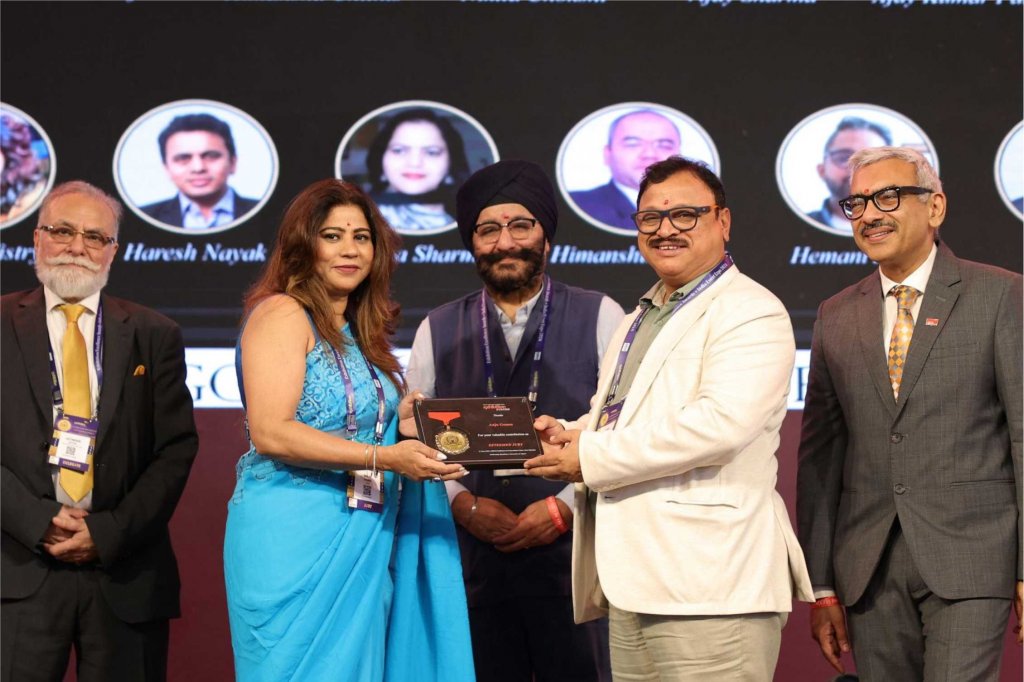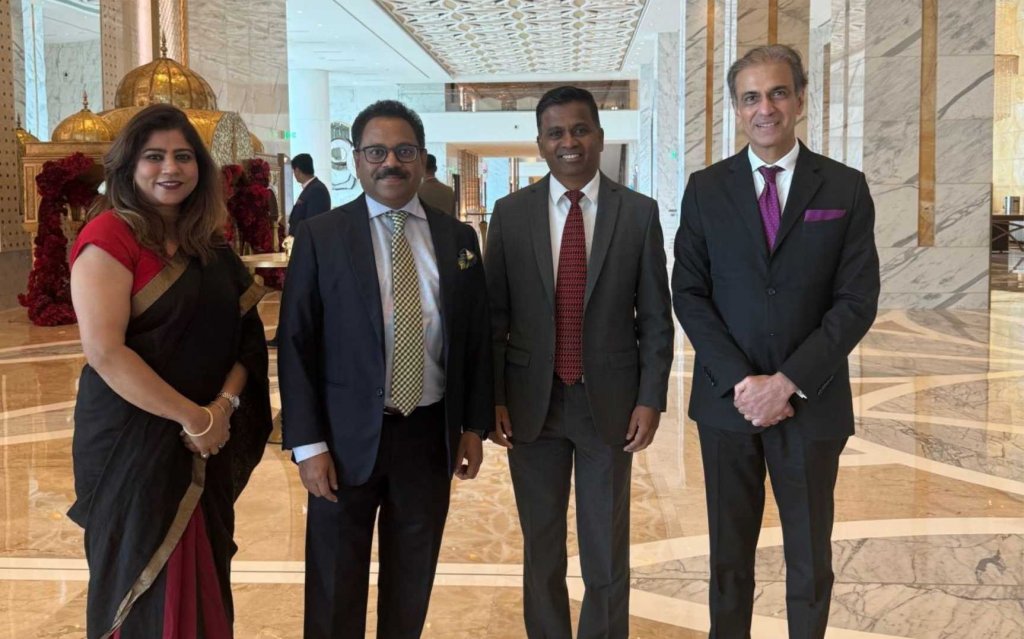TMS. What legacy do you hope this year’s Congress in Abu Dhabi will leave behind for the city and the MICE industry?
Anju Gomes. This year’s Congress in Abu Dhabi will definitely leave a lasting legacy that significantly will benefit both the city and the business events industry. One of my key aspirations is to enhance the engagement of universities and students by actively involving them in the Congress. By facilitating their participation, we can inspire the next generation of professionals and encourage their interest in careers within the business events sector.
Additionally, the Young Professionals Forum will serve as an essential platform for emerging talent, providing them with valuable networking opportunities and insights from industry leaders. This forum aims to empower young professionals by addressing their unique challenges and fostering their growth within the sector.
Furthermore, I envision the Congress contributing to long-term capacity building in the region through targeted education and mentorship initiatives. By establishing ongoing training programs and mentorship opportunities, we can help cultivate local talent and enhance the skill sets necessary for thriving in the business events industry. This approach not only strengthens the workforce but also ensures that the region remains competitive and innovative in attracting international events.
Ultimately, I hope this Congress will not only showcase Abu Dhabi’s capabilities as a premier meetings destination but also lay the groundwork for sustainable growth and development within the business events industry, creating a positive impact for years to come.
TMS. Your journey with ICCA has been quite remarkable. Could you tell us about how your career in the MICE industry began and what drew you to ICCA?
Anju Gomes. My journey with ICCA has been both a rewarding and transformative experience, shaped by over 25 years of dedication to the MICE industry. I began my career in 1996 with Emirates Group, where I took on roles in business development, event coordination, and managing key corporate and government accounts. This early exposure gave me the foundation I needed to understand the complexities of the global meetings and events landscape, and set the stage for a diverse career in the industry.

It was during this time, that I first became an ICCA member. I quickly recognized the significant impact ICCA had on the global meetings industry, particularly in fostering knowledge-sharing, innovation, and business development. ICCA’s mission and global reach inspired me, and it became a career goal to one day contribute to this organization more directly.
After a decade with Emirates Group, I continued to explore different facets of the MICE industry, working with organizations like Dubai Event Management Corporation and later the International Association of Public Transport (UITP), where I was the Director of Events and Finance for the MENA region. In this role, I spearheaded high-profile events, implemented strategic initiatives, and worked closely with regional governments and stakeholders to deliver world-class events. This experience was instrumental in refining my leadership and project management skills, and further deepened my understanding of the importance of collaboration in the industry.
In 2019, after two decades of professional growth and building strong relationships within the MICE industry, I was fortunate to join ICCA as the Regional Director for the Middle East. This role has allowed me to channel my passion for the industry into helping others succeed, by creating opportunities for ICCA members in the region, supporting knowledge exchange, and fostering collaboration between regional stakeholders and global players. Joining ICCA has been a pivotal point in my career. It has given me the opportunity to work with some of the most dynamic and innovative minds in the MICE industry, while also allowing me to contribute to the development and professionalization of the sector in the Middle East. My journey has been driven by a deep belief in the power of global collaboration and the impact that well-executed business events can have on economies, industries, and societies. Being part of ICCA has not only aligned with my professional aspirations but has also allowed me to realize my vision of contributing to the global meetings industry in a meaningful way.
TMS. As the Regional Director for the Middle East, you play a critical role in shaping the association meetings landscape in the region. Can you share your vision for the sector’s growth and the strategic initiatives you’re currently leading?
Anju Gomes. As the Regional Director for the Middle East, my vision for the association meetings sector is centered on positioning the region as a global hub for high-impact, knowledge-driven events. The Middle East has experienced tremendous growth in its business events infrastructure, and I see a great opportunity to harness this momentum to attract more international associations and conferences, while also strengthening our regional networks. One of the key initiatives I’m currently leading is expanding ICCA’s presence and influence in the Middle East through targeted member engagement and capacity-building programs.
We are focusing on empowering local associations and convention bureaus to bid more confidently for international events, which is crucial for elevating the region’s profile on the global stage. This involves delivering comprehensive training and sharing best practices with our members, helping them leverage ICCA’s vast resources to improve their bidding strategies and event execution.
In addition, I’m championing efforts to promote sustainability within the MICE sector in the Middle East. By integrating sustainable practices into the planning and execution of events, we not only align with global trends but also enhance the long-term value of hosting events in the region. Sustainability is becoming a key consideration for international associations when choosing destinations, and we want to ensure the Middle East is well-positioned to meet these expectations.
I am also working on building stronger partnerships between government bodies, tourism authorities, and the private sector to create an ecosystem that supports the growth of the association meetings industry. By fostering collaboration across these sectors, we can ensure that the Middle East continues to be an attractive destination for international meetings and conventions, driving both economic growth and knowledge exchange.
My vision is to see the Middle East become a leading destination for association meetings, not only because of its world-class infrastructure but also due to its ability to deliver high-quality, innovative, and sustainable events that leave a lasting legacy.
TMS. In your role, what strategies do you use to promote the Middle East as a key region for global meetings and events?
Anju Gomes. In my role as Regional Director, I promote the Middle East as a key region for global meetings by leveraging its strengths-world-class infrastructure, strategic location, and growing expertise in hosting international events. A key strategy is fostering strong partnerships with local convention bureaus, tourism authorities, and government bodies to present the region as a unified, attractive destination. I also focus on empowering ICCA members through training and best practices to help them successfully bid for international events.
Additionally, I highlight the region’s alignment with global trends in sustainability and innovation, positioning the Middle East as forward-thinking and capable of delivering impactful events. Success stories from previous events in the region help reinforce its potential, creating a compelling narrative for international associations to choose the Middle East for their future conferences.
TMS. The 63rd ICCA Congress is taking place in Abu Dhabi, a city known for its state-of-the-art facilities and rich cultural heritage. What makes Abu Dhabi the perfect destination for this year’s Congress, and what are you most excited about for the event?
Anju Gomes. Abu Dhabi is the ideal destination for the 63rd ICCA Congress, offering a unique blend of state-of-the-art facilities and rich cultural heritage. The city’s world-class infrastructure, including the ADNEC Centre, ensures delegates have access to top-tier amenities while its strategic location facilitates global accessibility.
I’m particularly excited about showcasing Abu Dhabi’s role as a premier meetings destination through our new Hub concept, which will enhance engagement and interaction among participants. This dynamic space will foster collaboration and creativity, transforming traditional meeting formats.
The Congress will focus on four key content pillars:
Technology and Innovation: Showcasing cutting-edge tools and practices that enhance the event experience and facilitate interactive learning.
Cultural Awareness & Social Impacts: Highlighting Abu Dhabi’s rich heritage while emphasizing legacy, diversity, equity, and inclusion (DEI) within the MICE industry.
Sustainability and Environmental Impact: Incorporating eco-friendly practices and showcasing the region’s commitment to sustainable initiatives in events.
Sustainability and Environmental Impact: Incorporating eco-friendly practices and showcasing the region’s commitment to sustainable initiatives in events.
Business Trends & Growth: Facilitating discussions on industry trends, sales, and marketing strategies to drive growth within the sector.
Together, these pillars will create a vibrant ecosystem within the Hub, setting the stage for memorable experiences and fostering lasting connections among industry leaders.
TMS. ICCA has been instrumental in driving innovation and collaboration in the MICE industry. How does the organization foster global partnerships and help regions like the Middle East enhance their market share in the international MICE industry?
Anju Gomes. ICCA plays a crucial role in driving innovation and collaboration within the business events industry by fostering global partnerships and enhancing regional capabilities, particularly in areas like the Middle East. The organization facilitates networking opportunities through its global events, forums, and workshops, allowing industry stakeholders to connect, share best practices, and collaborate on initiatives that drive growth.
In the Middle East, ICCA helps enhance market share by providing tailored training and resources that empower local associations, convention bureaus, and industry professionals. This includes capacity-building programs that focus on effective bidding strategies, event management practices, and marketing techniques to attract international events.

ICCA also actively promotes the region on global platforms, highlighting its strengths and unique offerings to potential event organizers. By showcasing successful case studies and facilitating knowledge exchange, ICCA positions the Middle East as a competitive player in the international business events landscape.
Additionally, through its focus on sustainability and innovation, ICCA encourages regions to adopt forward-thinking practices, ensuring they remain relevant and attractive in a rapidly evolving industry. This holistic approach not only enhances the region’s reputation but also drives economic growth and development in the business events sector.
TMS. Sustainability is a key topic globally. How is ICCA encouraging its members to adopt more sustainable practices in organizing meetings and events?
Anju Gomes. ICCA encourages its members to adopt more sustainable practices in organizing meetings and events through various initiatives and resources. Sustainability is one of our four main pillars, and it is incredibly important to ICCA. Our heritage and global reach position us uniquely as true advocates for sustainability in the international events and meetings industry.
We recognize that sustainability means making a commitment to the health and well-being of our industry by advocating for sustainable growth through education, knowledge transfer, policy changes, and job creation. ICCA is built on sharing knowledge and building trust, which helps us frame our sustainability proposition. While we understand that some countries and communities are further along the road to sustainability than others, we believe we can inspire our members to develop their own sustainable best practices and demonstrate the positive and lasting effects their events can bring to their communities and brand profiles. To support our commitment, we reference the United Nations Sustainable Development Goals (UNSDGs) as a common benchmark for our initiatives. ICCA understands what our industry needs to do to change perceptions and take the initiative to transform the way we work.
Key initiatives include the ICCA Gastronomy Pledge, which commits to reducing food waste and promoting the use of local, sustainable food sources during Congress events. This initiative encourages members to prioritize local, seasonal, and ethically sourced food options, enhancing the attendee experience while supporting local communities and reducing carbon footprints.
Additionally, ICCA is committed to the Net Zero Pledge, which outlines a roadmap for organizations in the business events sector to achieve net-zero emissions by 2050. Through this pledge, we support our members in implementing strategies to reduce greenhouse gas emissions and improve sustainability across their operations.
By fostering a collaborative environment, ICCA promotes the sharing of success stories and innovative solutions among members, empowering them to implement effective sustainable practices. Through these efforts, ICCA not only helps members enhance their reputations but also contributes to the broader goal of minimizing the environmental impact of events worldwide.
TMS. As a female leader in a rapidly growing sector, what advice do you have for women aspiring to take on leadership roles in this industry?
Anju Gomes. As a female leader in the rapidly growing business events sector, my advice for women aspiring to take on leadership roles is to embrace their unique perspectives, as diverse viewpoints drive innovation and foster inclusivity. Research from McKinsey & Company shows that organizations in the top quartile for gender diversity are 21% more likely to experience above-average profitability, highlighting the value of diverse leadership.
Seek mentorship and build strong professional networks, as studies indicate that women with mentors are more likely to advance in their careers. Investing in continuous learning is crucial, especially with the business events market projected to reach $1,550 billion by 2028, according to Allied Market Research. Confidence and assertiveness are essential; many women underestimate their abilities, which can hinder their advancement. Advocating for yourself is equally important—research from Harvard Business Review found that women are less likely to negotiate their salaries, contributing to the gender pay gap.
Lastly, champion diversity and inclusion as a priority. Companies with more women in executive roles often have better representation across all organizational levels. By embracing these principles and recognizing the importance of women in leadership, aspiring leaders can carve out their paths in the business events sector and contribute to a more inclusive industry.












